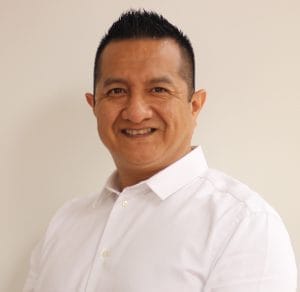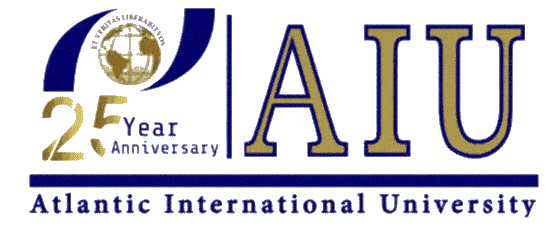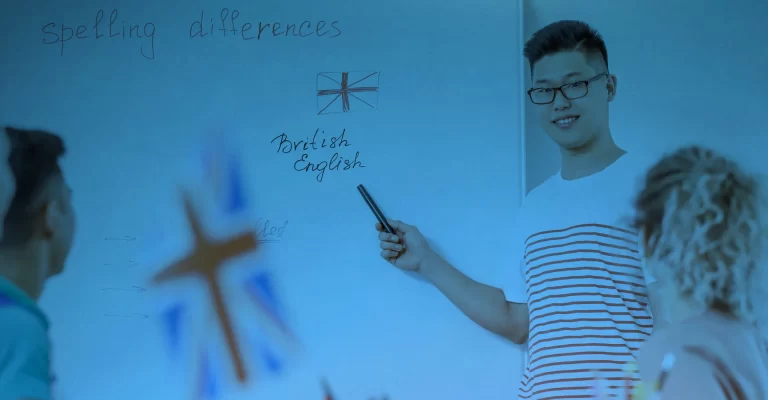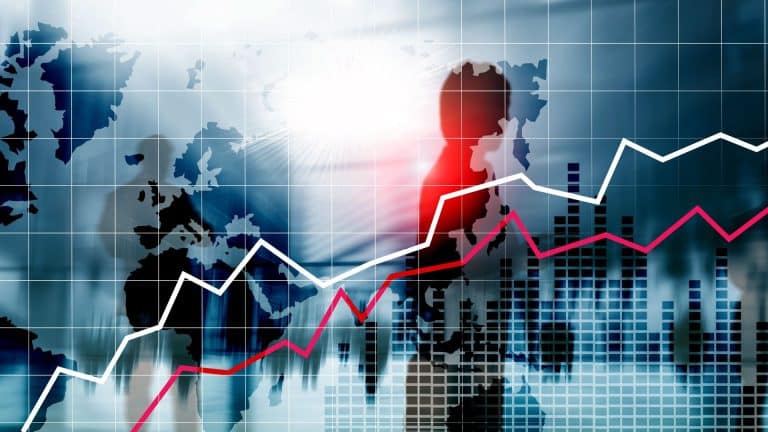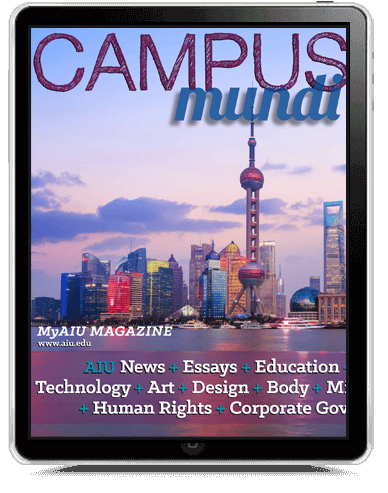

January 2022 Edition!
AIU News + Essays + Education + Culture + Science + Technology + Art + Design + Body + Mind + Environment + Human Rights + Animal Rights + Project Management + About AIU
Article published
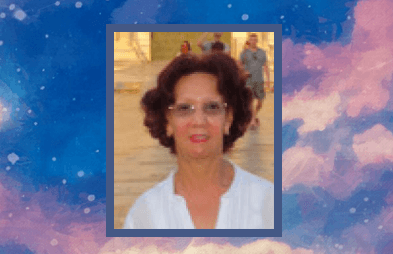
November 16, 2021. Our Academic Advisor, Dr. Rosa Hilda Lora, published the article “From the truth follows the truth” in the newspaper “El Siglo” where she is a columnist. Summary: There are many who will say: there is a holy God! It smells like Philosophy to me. Philosophy I never understood what it was about! That is a matter of long ago! That the truth follows the truth sounds very nice. Well yes, from the truth the truth follows. That Philosophy thing is from very distant times and now we are in the world of Cybernetics. You can read the rest of Dr. Rosa Hilda Lora’s article at the following link: https://elsiglo.com.gt/2021/08/06/ de-la-verdad-se-sigue-la-verdad/ Dr. Rosa Hilda Lora, Academic Advisor of AIU, graduate of the Doctorate in Philosophy with a specialization in Contemporary Philosophical Systems with us at Atlantic International University.
Thesis defense
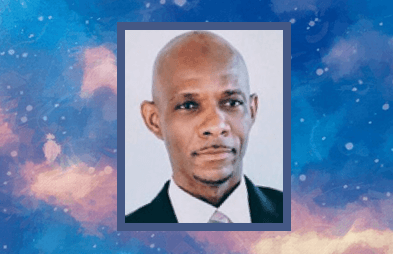
November 2, 2021. Atlantic International University is delighted to share the Thesis Defense of one of our students, Dexter Parker. Dexter recently presented his thesis defense which was graded with an A. The thesis was titled, “An investigation of factors affecting employee performance and work productivity at the HLBTCI Ltd. Helping Local Businesses”. Abstract: This dissertation examines the work environment at a private local accounting business, namely “HLBTCI LTD.” The principal problem was employee dissatisfaction, feedback on performance, work distractions. This thesis seeks to identify and address the practical research problem and how it affects performance and productivity. Chapter one provides the essential background information, rationale for the research, presentation of the issues, scope of the study… Dexter completed a Doctorate program in Human Resources Management at Atlantic International University.
Thesis defense

December 12, 2021. Atlantic International University is delighted to share the Thesis Defense of one of our students, Malika Victoria Sweta. Malika recently presented his thesis defense which was graded with an A. The thesis was titled, “The conundrum of injection safety practices among nursing students in Lusaka, Zambia: A phenomenological analysis”. Abstract: This thesis focuses on the student nurse experience of injection safety using a qualitative methodology through an interpretative phenomenological analysis approach in order to provide insight into the lived experiences of the study participants in addition uncover perspectives on injection safety practices during clinical training. Due to the dearth of injection safety data in Zambia’s context, this current research contributes to an understanding of unsafe injection practices among student nurses which also results to occupational exposures to bloodborne pathogens. Malika completed a Doctorate program in Public Health Administration at Atlantic International University.
Graduated with Distinction
November 15, 2021. Atlantic International University is delighted to share the Thesis Defense of one of our students, Ada A. Lawrence. Ada recently presented his thesis defense which was graded with an A. The thesis was titled, “A Case Study on School Management and the Administration of Discipline at a Primary School in Central Jamaica: Challenges and Solutions”. Abstract: School indiscipline continues to be a challenge in Jamaican schools. Because school management is crucial to the reduction of student indiscipline, there is the need to understand the steps taken by school management in Jamaica to arrest indiscipline. This case study sought to investigate the school management strategies of one school in central Jamaica and to describe how these strategies are used to ensure that the school goals are met. Additionally, the study sought to understand how discipline is administered and maintained at the school. This study utilized the qualitative research approach; specifically, the qualitative case study design. Interviews, focus group discussions, and document reviews were used to collect data while analysis of the data was done using content analysis. Ada completed a Doctorate program with specialization in Educational Leadership at Atlantic International University.
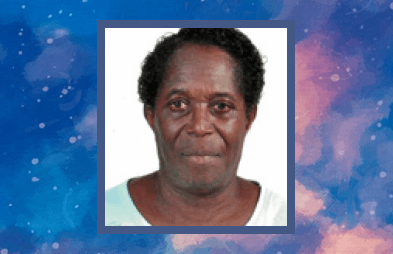
Testimonials
FIND MORE TESTIMONIALS FROM A I U STUDENTS HERE: https://wp24.aiu.edu/Testimonials.aspx
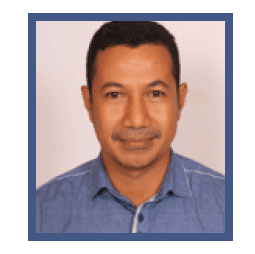
Mario Marques Cabral
Doctor of Project Management
October 7, 2021
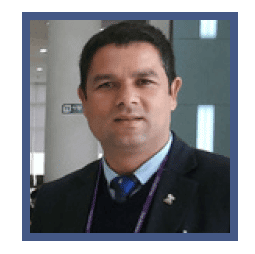
Shivajee Sapkota
Doctor of Human Resources Management
October 15, 2021
An african best optimistic magical recovery approach to COVID-19

This calls for a close fostering and building trust among all partners to attract an open investment of both time and money. Financial constraints is a major blow to yield an African homegrown solutions to achieve a COVID-19 socio-economic recovery. Amref Health Africa, Africa governments and partners must seriously make it a priority to seek or influence Direct Funding that will allow communities realize proper funding anchored on trust and open, transparent communication and engagement for local communities benefit to support and enhance development and implementation of strategic action that will lead to stronger communityled free COVID-19 securitybased on ethical consideration for community-based participatory COVID-19 recovery in Africa. The need to establish trust in 47 counties in Kenya is urgently called for at this early time with urgent and serious consideration from the governments, Amref Health Africa, World Bank, UN, UNDP, IMF, African Development Bank, Africa Union, UNICEF, UNHabitat, USAID, and other partners between indigenous communities and Amref Health Africa and all players and urgent need to work on relevant transformed policies and fundamentally not on their local constitution but the UN International human right charter which are functional in all the commonwealth nations to establish mutually functional grassroot based Village Council for Information Engagement policies,legislations and literatures meant to create a COVID- 19 recovery and relevant to a WHO and UN COVID-19 Interventions general guidelines, global preparedness to fight COVID-19 pandemic around the world. In deed, this is also a magnificent period to engage indigenous communities in Africa with their diversified cultural and traditional norms to be funded by or through Amref Health Africa, World Bank, IMF, UN, UNICEF, UNEP and other development players towards an Africa socioeconomic COVID-19 recovery and sustainable development to help these indigenous communities develop and mobilize policies and guidelines that will promote new-tech , traditional knowledge, cultural norms, human rights, and use of natural resources among their people and also to create equitable balances of power between community members, governments and all partners in order to support and promote trusting and equitable relationship and service delivery at all levels
COVID-19 recovery methods for Africa 1. Africa countries governments establish social welfare protection policies including liquidity to SMES, Households and Informal workers . 2. In partnership, Africa governments, international community and NGOs should design and develop progressive social protection coverage for health, investments and entrepreneurship to strengthen societal and economic resilience reducing vulnerability to external shocks in trade and commodity prices through regional integration and digitalization. 3. There is an urgent need to develop a post COVID-19 resilient economic development policy recovery with Africa governments and international community partners acting together for accelerating transformation to realize sustained economic welfare gains including helping households, communities and counties to strengthen coping measures that reduce losses thus allowing for a faster recovery and investing more funds to indigenous communities adapt to and mitigate the effects of future shocks. 4. Amref Health Africa and other players to start negotiating with Africa governments to reduce taxes imposed to larger and smaller companies to influence more exports rather more imports and the same to be imposed on digital technology appliances to grow our local companies to sustain employment and increase revenue. 5. On behalf of African countries, let Amref Health Africa and partners to start an international negotiations that will see African governments are exempted from paying the large accumulated debts, and offers to them free access to Foreign Direct Investments (FDI) now and not tomorrow from world Bank, IMF, African Development Bank among others —we start a new life together.
6. Mapping the pandemic effect and the way forward legislative reviews and policy reconsiderations are important to grow innovation, productivity ,good job creation, take advantage of scale opportunities and encouraging investments locally. 7. It is time for Africa people and government to move quickly to stay ahead of more coming COVID-19 risks while achieving an African food value chains, raising on-farm productivity, lowering the costs of cost of production and distribution to cities and small towns, facilitating private investments in logistics and processing and most importantly, successfully implementing appropriate adaptation policies for climate change which will create and inspire a kilimobiashara life to vulnerable regions or areas or indigenous communities, and I am very much convinced that if Africa people and governments and partners adapt this important resilience factor free from corruption and impunity then definitely poverty reduction is going to be realized among the indigenous communities in Africa. 8. Africa must undergo an ambitious reform involving the indigenous communities directly reforms that will support job creations , strengthen equitable growth , protect the vulnerable and contribute to environmental sustainability going forward towards a stronger recovery across the African continent. 9. There must be enough money to expand and increase rural electricity supply to households in Africa countries, an increase of around 40% and an increased 20% to complete in the global economy. For the purpose of prioritizing COVID-19 response and recovery, I strongly believe USA, UN, IMF, UNDP, World bank, Africa Development Bank and all other international community partners including Amref Health Africa should start a quick negotiation on behalf of Africa people and governments that funds be made available to electricify health facilities, education, institutions, business markets and non-farm business and to support regulators and utilities struggling with the unfolding impacts of the pandemic in all African countries with aim to provide demand –driven assistance companies, investors, and industry associations aimed at ensuring business continuity mobilizing relief funding and advocating for government policies that recognizes energy access as an essential in Africa. This is only happening in Nigeria, South Africa and West Africa.
10. COVID-19 and Climate Change are the existential challenges of the century, making it critical that all recovery efforts are climate resilient and contribute to greener development pathways in this regard, among other aspects, additional attention to climate change adaptations is warranted and a more urgent horizon to food security that would see many African countries going real kilimo-biashara production with enough funds. 11. It is also very important to improve investment climate indicators so that Africa countries can attract a large volume of private investment where it takes longest period and expensive licensing to start business to offset the impact of fiscal consolidation efforts. 12. Urgently, there is need for mutual partnership of serious coalitions to build the capacity of indigenous communities and the target groups such as Artist organizations, Civil Society organizations, Commununity based organizations, Faith Based Organization, Elders Organizations, Health workers, Workers Union, Students organizations, Youth and Women groups, leading health and research institutions in curbing and recovering from the pandemic disease in African countries or we shall perish from COVID-19.
Technical challeges imposing risks to COVID-19 recovery in Africa • Lack of inclusive community approach to the elderly vaccines. • Failure to adopt civil society organizations, Artist organizations, CDOs, FBOs, Workers union, NGOs inclusivity to reach indigenous communities for COVID-19 awareness and vaccination purposes. • Many G7 and G20 countries withholding vaccine drugs to reach Africa. • Many drugs in Africa have been destroyed in Africa due to expiry dates. • Poverty privilege and cultural imbalances may cause Africans to suffer most from COVID-19 impacts. • Over reliance on international countries may fail African health and socio-economic recovery from COVID-19. • Commonology diseases among Africans may widely expose Africans to COVID-19 risk if not controlled. • Lack of a serious informed resilience and recovery community /citizenry based capacity buildings and strengthening from national and county governments and partners needed. The End
Call to African countries economic growth

Economic growth In this paper we are going to look at economic growth before we come to talk about its opposite. Economic growth is very important to the development of every country, because the stronger the country’s economy is the more developed that country will be, so it’s the economic growth that determines whether a country is rich or poor. Apart from that when a country’s economy has grown then that country will be rich and will enjoy the benefit of that economy, for example countries like England, France, Russia among others are rich because their economy is freely grown, while third world countries are poor because of their inability to have their economy grown, so economic growth is very important. However, it’s something that determines how much respect a country will enjoy from other world countries. Before I go differ I will like to define what economic growth is all about, as the name indicates economic growth is all about the development of country’s economy, for example when every sector of a country is growing smoothly especially financial and production sectors which are major drivers of economy in a country then that country enjoy its economy, because it will have job opportunities for its citizens and poverty will be eradicated in that country, and we can say that there is economic growth in that country. Even though there are other specialists that determine whether economy is grown or not, but what I have just enumerated are some of the major things that are considered when determining whether the economy of a country is grown or not.
Lack of economic growth Lack of economic growth is when a country has a problem in terms of production and financial sector, that is how the finance of such country is managed then that country will be in a very difficult situation, and when a country fail to be a producer and become consumer then that country is at the risk of the opposite of economic growth that is lack of economic growth. I think this is true when one looks at African countries and Nigeria in particular; because in Nigeria there are only few things that are produced in the country, most of the things that are used in the country are imported from other countries, this is what is causing negative effect on the growth of the Nigerian economy, because any country that is unable to be a producer then that country is in serious problem because of these factors: • For example when a country is exporting its products it means that those who come to that country in order to buy its products and export to their country will have to exchange their money with the currency of the country from which they buy such goods. But in Nigeria the reverse is the case because everything is imported, because we do know that dollar is a global currency we have to change Naira into Dollar before we buy certain goods from other countries, so that is why the value of our currency is always decreasing. We do know that the value of a currency plays a very important role, it’s something that is taken into consideration when deciding whether the economy of certain country is growing or not, so lack of production affects Nigeria negatively because of what I have just mentioned.
• Apart from that, financial sector too plays a vital role in the growth of a country’s economy. Because this is something that is evident when one looks at how government and other financial institutions managed the finances of Nigeria, poor decisions are made with regard to the financial sector, so that is why we find it difficult to develop as the nation, may be this problem is happening because of lack of those who are specialized in terms of economy, or maybe we have those who specialized in the economy is just that they are not given an opportunity to come and play their role in developing the economy of the country, for example leaders too are to be blamed for lack of the economic growth in the country, because they take poor decisions which jeopardize the economy may be is because of their lack of knowledge on how economy is supposed to be developed or something like that, so that is why we face lack of economic growth. If you take a look at the former president of Nigeria Late Umaru Musa ‘Yar Aduwa he will serve as a good example, because as soon as he came to power he took certain decisions regarding the economy of Nigeria, and those decisions work within a very short time. So from this we can deduce that lack of leaders with sufficient knowledge of how economy is supposed to run is part of the problem that makes our economy stagnant. Economic growth is something that can only take place when several majors are put in place, but if a country like ours is difficult to implement such majors then it will lead to the lack of development of the economy, because it will never witness huge economic growth, it can only dream of having economic growth.
When we look at countries like Australia, China, Japan and others they work hard and put in place measures that brought them to the state they are at the moment, for example why it is that economy of China is growing very fast? The answer is known by almost everybody, because nowadays it’s difficult to find a country where Chinese’s goods is not bought, so this means that they are developed and they are witnessing economic growth, because they prioritize production, as you know production is the backbone of any economic growth, any country that can be proud of having economic growth then such country is producing goods in large quantity and export to other countries. This means that if third world countries were to develop they must ensure that they produce certain things that are needed by other countries of the world, but as long as they will continue to be dependent, to be reliant on what will be produced in other countries then they cannot have economic development that they are hoping, so large part of economic growth is always attributed to mass production, that is producing different things that various countries are in need of. Nigeria can produce many goods as it endowed with many natural resources such as Crude Oil, Gold, Diamond, Iron, Uranium, Nickel, Copper, Coal etc. below is the Nigerian map with endowed natural resources and their location
Due to these more than 30 mineral resources Nigeria endowed with but it over relied in one thing that is crude oil, because crude oil many countries are in need of, many countries are exporting crude oil from Nigeria on a cheapest price, and we import petrol, diesel, gas on expensive prices from the countries we sold oil to, because we can’t refine, our refineries are not working, that is why the petrol price is always increasing in Nigeria, and it’s a well known by everybody that these petrol, diesel, gas, kerosene and many more are refined from this crude oil, which is a big problem in Nigeria lack of refining, because it plays a vital role to the lack of economic growth in Nigeria. For example when a motorist buy petrol on expensive price so the transport fare will be expensive and that will definitely lead to the increase in almost everything, according to Yvonne Mhango, an analyst at renaissance: “The impact of the petrol price hikes could go beyond simply pushing up transport costs. It is also expected to affect the cost of producing goods and services. In particular, the prices of food, clothing and footwear, furnishings, as well as housing and utility costs may tick up on the back of the scrapping of the petrol price subsidy. In addition to higher petrol prices, the cost of producing electricity from petrol-powered generators is also expected to rise”.
So that is why the increase in petrol is big problem to the most Nigerians, because it affects the development of the economy in the country. If this problem is to be eradicated government should pay attention on rehabilitating the existing refineries and constructing the additional refineries that had been proposed. Furthermore, unemployment is a major cause of lack of economic growth in Nigeria, and it’s a known fact that unemployment has a root from lack of job opportunities, because if there is no job opportunity then definitely you will find a situation whereby there are jobless people in the society or within country. And unemployment is the major cause of the crises; it’s the crises that help to the lack of economic growth, because when people have experiences and they have no job, then there is likelihood for them to engage in stealing or armed robbery. Because of the lack of job opportunities in Nigeria that is why we have so many crises, so many insurgents, armed robbers, kidnappers etc. According to National Bureau of Statistics, by its statistic on December, 2020: “The jobless rate in Nigeria rose to 33.3% in the fourth quarter, more than half of labor force are unemployed or underemployed”. Job opportunities are limited to the growth of the economy in Nigeria. So government has to play a vital role in order to come up with job opportunities, by boosting agricultural sector, since Nigeria is blessed with good soil for agriculture we crops many resources, we have cotton, rubber, sugarcane, millet, rice, beans etc. so government has to come up with technical and vocational training to the farmers, since many of our farmers are uneducated and to give them a funds and properties that support them to carry out their work of farming successfully. According to scholars the following majors cause unemployment in Nigeria as well as other developing countries:
“Neglect of agricultural sector, rural-urban migration, wrong impression about technical or vocational education or training, corruption with its attendant grave embezzlement, rapid population growth, low economic growth and activities, low investment, leadership and managerial problem, lack of political will, outdated school curriculum making Nigerian graduates unemployable, poverty, lack of adequate youth development programs, increase in the supply of educated manpower as a result of producing more graduates than available jobs and more painfully, the gradual collapse of manufacturing sector (Adesina, 2013; Salami, 2013; Nwanguma, et al. 2012; Adebayo, 1999; Alanana, 2003; Echebiri, 2005; Ayinde, 2008; Morphy, 2008; Awogbenle & Iwuamadi, 2010; Okeke, 2011; Njoku & Ihugba, 2011 and Anyadike, et al. 2012)”.
Nigeria has many sectors that need to be boosted, but at least government has to boost agricultural sector first. Apart from that, economic growth of most third world countries is hampered by the loan they have taken from developed countries, mostly when poor countries go to developed countries for loan, before such loan is given certain conditions are laid down for that country to adhere to, and those conditions that are laid down mostly affect the economy of the recipient county, but it doesn’t mean that developed countries don’t take loan, No! They take loan but they use it judiciously in order to boost their economy further, for example even America takes loan, the loan that America has taken is huge is something that I can’t quantify, but you can’t say that America is underdeveloped because it took loan No! Because even if such loan is taken it will be used in order to further boost their economy, but in African countries even if the loan is taken is mostly embezzled by the corrupt politicians, so that is a big problem especially that my country Nigeria is facing, because currently it’s estimated that the loan taken by Nigeria is estimated to be more than 30 trillion, and the money taken as the loan were not put to good use, rather the money was mostly misappropriated and mismanaged by corrupt politicians and civil servants. So that is why for a country to have economic growth then I think that the only thing to be accorded priority is to be producer of a certain goods, and after such goods are produced then they are to be exported to other countries.
REFERENCES. 1. http://eprints.covenantuniversity.edu.ng/6771/1/ISROSET-IJSRMS-00209.pdf | 2. https://kenyafreepress. com/top-stories/counties/2511/nakuru-gubernatorial-candidates-engaged-to-push-economic-agenda | 3. https://dokumen. pub/role-of-ict-in-higher-education-trends-problems-and-prospects-9781771889629-9781003130864.html | 4. http:// www.canlibahissiteleri135.com/boko-haram-attacks-in-nigerian-hurting-business
Learning
Raising kids
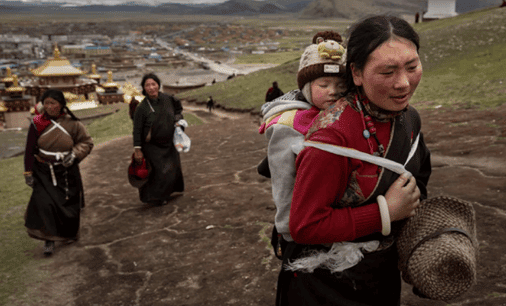
“Is he in his own room yet?” is a question new parents often field once they emerge from the haze of life with a newborn. But sleeping apart from our babies is a relatively recent development —and not one that extends around the globe. In other cultures sharing a room, and sometimes a bed, with your baby is the norm. This isn’t the only aspect of new parenthood that Westerners do differently. From napping on a schedule and sleep training to pushing our children around in strollers, what we might think of as standard parenting practices are often anything but. … In most other societies around the world, babies stick with their parents longer. A 2016 review that looked at research on children sharing not just a room but a bed with one or more of their parents found a high prevalence in many Asian countries: over 70% in India and Indonesia, for example, and over 80% in Sri Lanka and Vietnam. … Just as bedsharing keeps babies close during the night, babywearing provides a way to keep them close in the day while parents run errands or work around the house. Rather than a new trend, carrying children in a sling is something humans have done for as long as we’ve been around. “Babies’ biology has not changed dramatically over hundreds or thousands of years, but our culture has changed dramatically, and our expectations of babies and of … Read full text:
Personal music
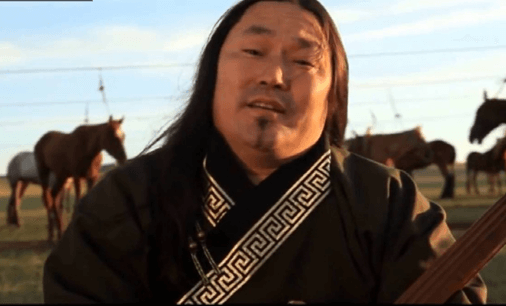
Almost everything that we know about the perception of music and what has served as a scientifically established foundation for modern views on the origin of music comes from a musical tradition based on frequency discrimination of musical sounds. It is this tradition that currently prevails in the world. Its prevalence probably started with the rise of Bronze Age urban civilizations, whose palace and temple music traditions relied on mathbased theory. Rationally defined pitches have made the corresponding music practices rely on the frequency aspect. Civilizations that cultivated frequency- based music imposed their influence on the music cultures of neighboring peoples. On a global scale, this must have resulted in a steady decline of the alternative form of TO that was based on timbre. This process is evident in the music cultures of many native Siberian peoples, e.g., the Nganasan, whose timbre- based tradition has been recently overtaken by the Russian frequencybased tradition. Schneider qualifies such development as “pitch reductionism” —the replacement of timbre-based tuning standards by frequency-based standards, most obvious in the indigenous gong/bell and xylophone music. Timbral vocal music is no less vulnerable to pitch reductionism. In the literature in English, the distinction between “pitch-centered” and “timbre-centered” Read full text:
AIU makes a huge contribution to the world by giving new scient ifics the space for original investigations and research. Visit MyAIU Evolution
Touching the Sun

NASA’s audacious Parker Solar Probe achieved the scientific first after three years and five Venus flybys, entering the Sun’s atmosphere on April 28, 2021. The achievement was announced at a press conference at the American Geophysical Fall Meeting in New Orleans during December, 2021. … NASA needed the intervening months to confirm they had actually done it — analyzing energy interactions recorded by the probe to try and mark the moment. Ultimately, the signature of the Sun’s magnetic field was the smoking gun that verified we had really, actually, touched the Sun. Since then, the probe has encountered the Sun twice more —once in August and once in November. … The liminal space between the Sun’s atmosphere and space is called the Alfvén critical surface. Prior to the mission, physicists knew this dividing line was there but didn’t know precisely where. Best estimates put it at 4.3 and 8.6 million miles above the surface of the Sun. But the Solar Probe complicates matters. In April, the probe entered the Sun’s corona at an altitude of 8.1 million miles above the surface of the Sun. In doing so, the probe confirmed the Sun’s atmosphere isn’t uniform in shape —it is not some big sphere encasing the burning orb. Rather, it flows with peaks and valleys that the probe passed through repeatedly. At its closest approach, the …
Read full text:
Smart bandage
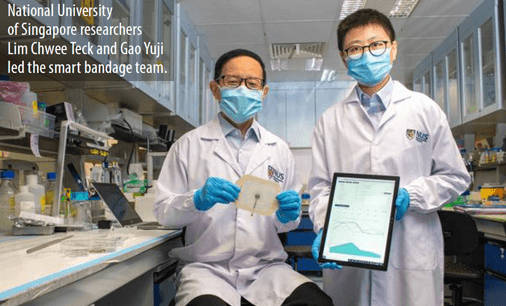
Researchers at the National University of Singapore have developed the world’s first smart bandage. The scientists, in collaboration with Singapore General Hospital, created VeCare, a bandage with a wearable sensor that can conduct real-time, point-of-care assessment of chronic wounds via an app. It uses sensor technology that can detect temperature, pH, bacteria type and inflammatory factors specific to chronic wounds within 15 minutes. It’s estimated that about 1% to 2% of people in developed countries will experience a chronic wound in their lifetime. VeCare could be particularly useful for people with diabetes who have foot ulcers. “The VeCare platform is easily scalable and customizable to accommodate different panels of biomarkers to monitor various types of wounds,” said Lim Chwee Teck, director of the iHealthtech at the National University of Singapore. The healing process of chronic wounds can be interrupted by infection and repeated trauma, which causes more pain and stress for the patient. In diabetic patients with foot ulcers, this can lead to more severe outcomes like amputation. Patients with nonhealing wounds often have to spend a lot of time and money getting tests and treatment to speed up recovery, a process that can take days and multiple visits to clinics. … Read full text
Get a better knowledge about our rights and the way we can use them on a daily basis to prevent any abuse or limitations of them. Visit MyAIU Human Rights.
Habitat pods
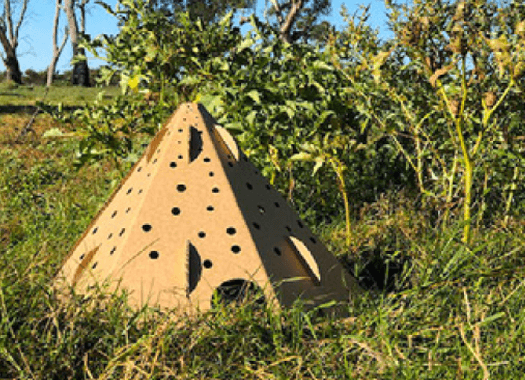
Dr Alexandra Carthey at Macquarie University in Sydney, Australia, might have just invented a tool to help small critters displaced by wildfires have a fighting chance at survival. The habitat pods, which are made of biodegradable cardboard, act as safe houses for animals such as possums, bandicoots, bush rats, and even reptiles during dangerous situations. Carthey was inspired to create a solution when she saw exposed wildlife being hunted by predators following the Black Summer bushfires in 2019. According to Macquarie University’s The Lighthouse publication, she found that while flying creatures, including bats, bees, and birds, have many innovative “nest boxes” catered to them, grounddwellers didn’t have the same means of protection. Hence, she created the mini shelters, which are pyramids … Read full text: Read full text:
Chidiebere Ibe
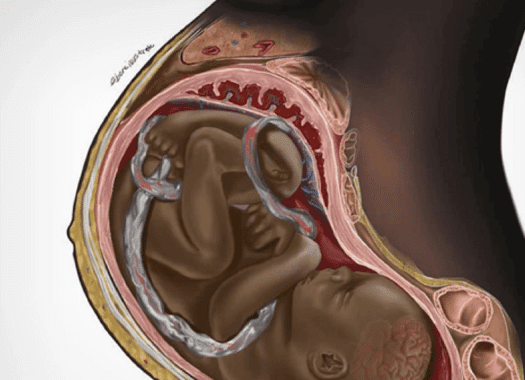
A Nigerian student’s black illustrations in medicine have gone viral worldwide. The 25-year-old’s work absolutely captured the world’s imagination after hitting the internet this month. As we’ve forever seen, medical media and biology textbooks largely feature white- to pale-skinned bodies, which suggests the idea that white is the default. This was until Chidiebere Ibe, a medical illustrator and neurosurgeon student, shared the artwork of the Black fetus with the caption, “I’m black, and black is beautiful! Diversity in Medical Illustration”. “More of this should be encouraged!” he added. Little did he know he was going to get the world’s attention, and oh boy he went viral. So’ what’s exactly viral these days? Well, Ibe’s black illustration for medicine post was shared by NBC News before receiving 41 000 retweets and nearly 170 000 likes on Twitter as of Monday morning. “I wasn’t expecting it to go viral. I was just sticking up for what I believe in, advocating for equality in health through medical illustrations,” he told the news outlet. … Read full text
Air 4 All
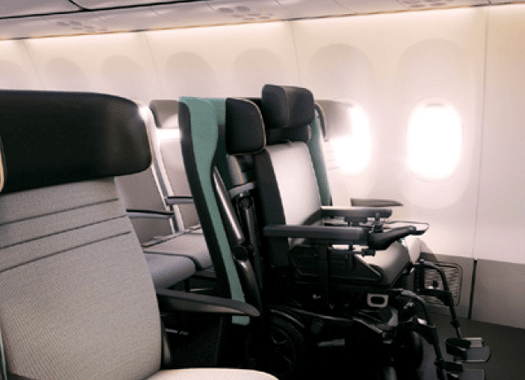
PriestmanGoode has unveiled Air 4 All, an aeroplane seating system that will allow powered wheelchair users to remain in their own wheelchairs for the entire journey. The concept is designed for commercial flights and is currently being developed into a prototype. “The biggest barrier in the past has been that giving greater space to passengers in wheelchairs would have reduced seat count and resulted in a loss of revenue for airlines,” said PriestmanGoode chairman Paul Priestman. “Air 4 All solves this problem and has the added benefit of enabling airlines to retain the design of their cabin on every seat, ensuring brand consistency and a cohesive brand experience for all passengers,” he continued … Read full text: Read full text
Live a better life learning how to keep your body, mind and soul balanced. Visit regularly MyAIU Body / MyAIU Mind / MyAIU Spirit and MyAIU Energy.
Yoga
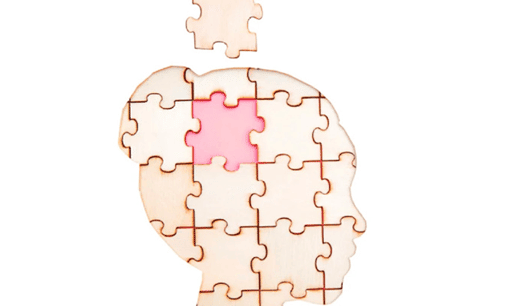
Our physical, emotional, and behavioral tendencies —both good and bad— aren’t ours alone. They’re often passed down from generation to generation. As a trauma therapist [Kathryn Templeton], it is critical for me to be versed in working with grief of the heart, confusion of the mind, and feelings of disconnection from meaning and spirit. My studies with breathing practices and yoga led me to study Ayurveda, the medical branch of the spiritual practices of yoga. … According to Ayurveda, physical, emotional, and behavioral imprints (samskaras) are carried from generation to generation. In Western medicine, these imprints are called “linked neural pathways,” created from the repetition of behavior over time, or the intensity of a behavior or event. … This idea of samskara can also be another lens through which to view tendencies toward alcoholism, depression, and anxiety. … The most important aspect of changing samskaras is creating awareness where there once was none. … becoming conscious and making decisions based upon your internal locus of control versus the habitual voice of our unconscious society. … The more I become more conscious, and take responsibility for choices that guide my life, the more I replace unhealthy samskaras with healthier ones … Read full text:
Seven things to say

People get mad. When we are the reason, we apologize. Other times, we just want to help. Telling an angry person to calm down is about as effective as eating soup with a fork. The person doesn’t want to hear it because they can’t. Their limbic system has often hijacked the brain and when someone is in the fightor- flight response, there’s no creativity, just a singular focus on the threat. … But the following phrases can get to calm. 1. “How am I right now?”. Before anything, ask yourself this. 2. Say nothing. The person is running at 80 miles per hour and needs time to ramp down. 3. “Is it ridiculously cold right now?” This question is off-center to make the person say, “What?,” but it’s also grounded in the shared moment. 4. “That’s so frustrating.” If the temperature has gone down, you can move into empathizing. Avoid “I” or “You.” 5. “I wonder if it would help to take a walk and get some coffee?” You’re leaving the scene and offering something else to do. 6. “How will that work?” Even after they have calmed down, they still might fume, “I want to hit the guy.” Respond with, “I get it” or “Don’t blame you,” followed with the above. 7. “Shut up.” To make the other person say, “Huh?” You’re redirecting the anger onto you because you’re able to take the person to a safe place. … Read full text:
Find Open Courses and a world of learning granted by AIU at courses.aiu.edu Help others study and change their lives. Visit MyAIU Pledge.
Cardamom Mountains
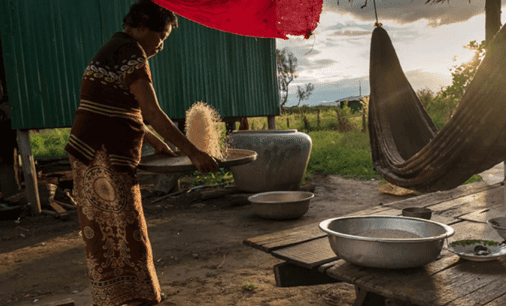
Cambodia’s Cardamom Mountains were once a stronghold of the Khmer Rouge, the fanatical communist regime whose presence lingered in the area well into the 1990s. For decades, the region’s isolated villages had little contact with the outside world. Bloody battles were waged between local villagers and guerrillas. The use of land mines was prolific. Consequently, the surrounding rainforest survived as one of the most pristine expanses of wilderness in Southeast Asia. As conflict eased and the land mines were cleared, the rainforest —along with its wildlife— was left vulnerable to illegal poachers, loggers and slashand- burn farmers. For the last two decades, a handful of environmental organizations has been racing against the clock to protect the area’s forests and the wildlife. Wildlife Alliance is at the forefront of those efforts. The organization prioritizes law enforcement and collaboration with local authorities, providing hands-on protection to around 3 million acres of the Cardamom Mountains rainforest. It also aims to create eco-friendly job alternatives —focusing on education, reforestation and wildlife rehabilitation and release— for locals who were previously involved in, or might otherwise be pressured into, illegal trades. … Armed, they now patrol the area on foot, by motorbike, by boat and by air, protecting the environment from poachers and loggers. …
Read full text:
Giant glacier in Antarctica
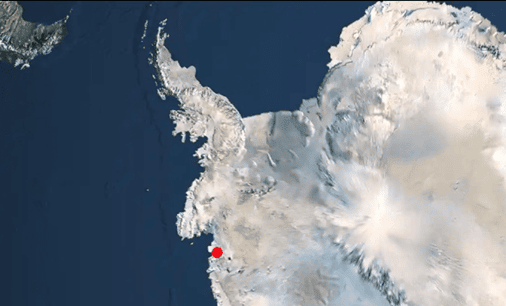
Twenty years ago, an area of ice thought to weigh almost 500bn tonnes dramatically broke off the Antarctic continent and shattered into thousands of icebergs into the Weddell Sea. The 1,255-sq-mile (3,250-sq-km) Larsen B ice shelf was known to be melting fast but no one had predicted that it would take just one month for the 200-metre-thick behemoth to completely disintegrate. Glaciologists were shocked as much by the speed as by the scale of the collapse. “This is staggering. It’s just broken apart. It fell over like a wall and has broken as if into hundreds of thousands of bricks”, said one. This week [Dec. 2021], ice scientists meeting in New Orleans warned that something even more alarming was brewing on the West Antarctic ice sheet—a vast basin of ice on the Antarctic peninsula. Years of research by teams of British and American researchers showed that great cracks and fissures had opened up both on top of and underneath the Thwaites glacier, one of the biggest in the world, and it was feared that parts of it, too, may fracture and collapse possibly within five years or less. Thwaites makes Larsen B look like an icicle. It is roughly 100 times larger, about the size of Britain, and contains enough water on its own to raise sea levels worldwide by more than half a metre. … Read full text:
Find support for your own unique art and design projects, or support other creative projects at MyAIU Research
Asking women

Dr. Ryan Stewart, a urogynecologist at the Midwest Center for Pelvic Health, recently posted on Twitter: “I have the opportunity to design my office from scratch. I’m asking women. How would you design/optimize a visit to the gynecologist’s office? No detail is too small. If I’ve ever had a tweet worthy of virality, it’s this one.” Turns out, there are a lot of ways to improve a visit to the gyno. Including: Kara K. — Acknowledgement that sexual trauma histories can make exams psychologically overwhelming for many. … Empathy would help in improving our sense of safety & reducing avoidance. Dr. Erin MacLean — No one should ever have to discuss any aspect of their care with anyone (nurse, receptionist) within earshot of other patients. Also, should not be able to listen to phone calls or dictation. … Hairy Sheldon — From my non- Twitter-using wife: Offer painkillers. Don’t make people ask. … Its still a Holly Jolly Pandemic, folks! — Find women who are wheelchair/ cane/walker/prosthetic users, and ask them what they need most. Wider hallways, exam tables that actually DO lower, more than one bathroom that is fully handicap friendly … Móniquita — A wide variety of speculum sizes, and introduction to the exam room including a play by play of how the visit will go. … most people wouldn’t disclose fear or stress if they have it. …
Read full text:
Bat midwives
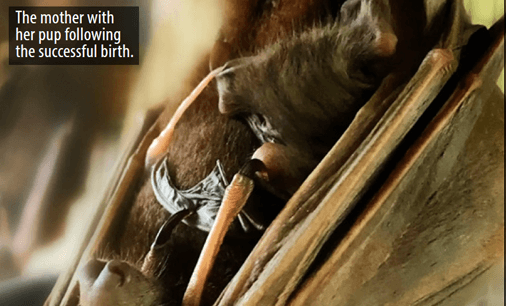
Find Open Courses and a world of learning granted by AIU at courses.aiu.edu Help others study and change their lives. Visit MyAIU Pledge.
Campus
How can people harmed by climate change be compensated?

Should people harmed by climate change be compensated? From typhoons and flooding to heatwaves and drought, research has shown that many disasters are already being made worse, or more likely to occur, due to climate change. Slow onset climate events like sea level rise, ocean acidification, loss of agricultural land or glacial retreat are also already taking place —sea level rise is now in the region of 3 to 4 mm per year. All countries will be affected by climate change, but some of the most impacted countries have done very little to cause it in the first place. These countries are also often the very ones that most lack the resources needed to deal with these disasters. The imbalance has been acknowledged by the leaders of developed countries and historic polluters, who have set up mechanisms to transfer financial support to developing countries to help them cut emissions and adapt to the consequences of climate change.
But support for another issue, known as “loss and damage,” has long been a politically fraught topic, and so far has only minimal support. The term refers to the consequences of climate change that can no longer be adapted to, explains Chikondi Chabvuta, Southern Africa region advocacy adviser at the nonprofit CARE. “It is really about reparations, and climate justice,” she says. “It’s these damages that are taking place within countries in the global south that are stretching their capacity to adapt and absorb the shocks. In the end, they are left with lost communities, lost livelihoods, lost lives, that cannot be put on an adaptation program.” The issue of finance for loss and damage blew up at the COP26 climate conference in Glasgow last month [Nov. 2021], where developing countries representing the vast majority of the world’s population supported the creation of a financial mechanism for it, but which eventually fell through.
A network has been set up to support “technical assistance” for dealing with loss and damage, but rich countries such as the US have been very resistant to putting money on the table to actually help countries recover from climate disasters. “Right now, the United Nations system has agreed to channel finance from richer countries to lower income countries so that those countries can transition to greener pathways, and so that they can become more resilient to future impacts,” Teresa Anderson, a climate policy campaigner at ActionAid, told me during COP26. “But if you’re destroyed by a climate disaster, and have to pick up the pieces and rebuild and recover, then you’re on your own.” Speaking last month at a press conference as COP26 concluded, John Kerry, the US special presidential envoy for climate, said his country remains “always thoughtful about the issue of liability.” He added: “What we think is, in the next few years, we have to work through what is this all about? How much money is needed for what? What’s the legality of it?”
Loss and damage means two things for small island states, says Sabra Noordeen, special envoy on climate change for the Maldives. “It’s the short-term immediate impacts of a natural disaster, and then there’s the more slow onset events like the destruction or death of our coral reefs.” Noorden thinks progress at COP in terms of climate movements, civil society, and the positions of the global south means there is now no going back to the historical obstructions to examining the issue. “We can’t talk about climate action and climate justice without addressing loss and damage.” But she also believes thinking about the issue only in terms of compensation or liability can make it more difficult to move these conversations forward. “Then it just feels like there’s no kind of incentive for the polluter, in a sense, to invest in climate finance or mitigation other than just to make up for the losses that they’ve caused. It should be seen as an investment for everybody to provide climate finance that addresses adaptation and loss and damage, because it has this impact on everyone. And that’s the way to move it forward.”
At COP26, Scotland broke a taboo when it offered £2 million for loss and damage, making it the first developed country to ever put forward this kind of finance. “As with anything else, if you want others to listen to your rhetoric, you must be prepared to lead by example,” said Nicola Sturgeon, First Minister of Scotland, at a press conference during the negotiations. “It is no longer excusable or acceptable to close our eyes to the loss and damage that is being done to countries around the world already.” Chabvuta was pleased to see Scotland taking this lead. “We hope that they’ve created a momentum that we could carry over to COP27,” she says. “When you come from the global south, these climate negotiations are really about justice: those responsible for the damages that are being created in [our] daily lives.” Read full text:
Help others study and change their lives. Visit MyAIU Pledge. Learn how to have a better financial control. Visit MyAIU Money.
Keith Haring Polaroid Now.

Each instant color photo in an assorted pack of eight has a frame with details from an iconic Haring artwork. store.moma.org
Flexible universal tablet stand.

Use it in bed, on the couch, or on any uneven surface and it holds your tablet at eye level, which is easier on your neck. The flexible legs fold compactly for easy storage. www.thegrommet.com
Jackrabbit eBike.

No heavy-lifting. No face-planting. Just 20 mph of pure electric fun. With quality materials and a really ridiculously good looking design. jackrabbit.bike
“Utah” Phillips (1935-2008).
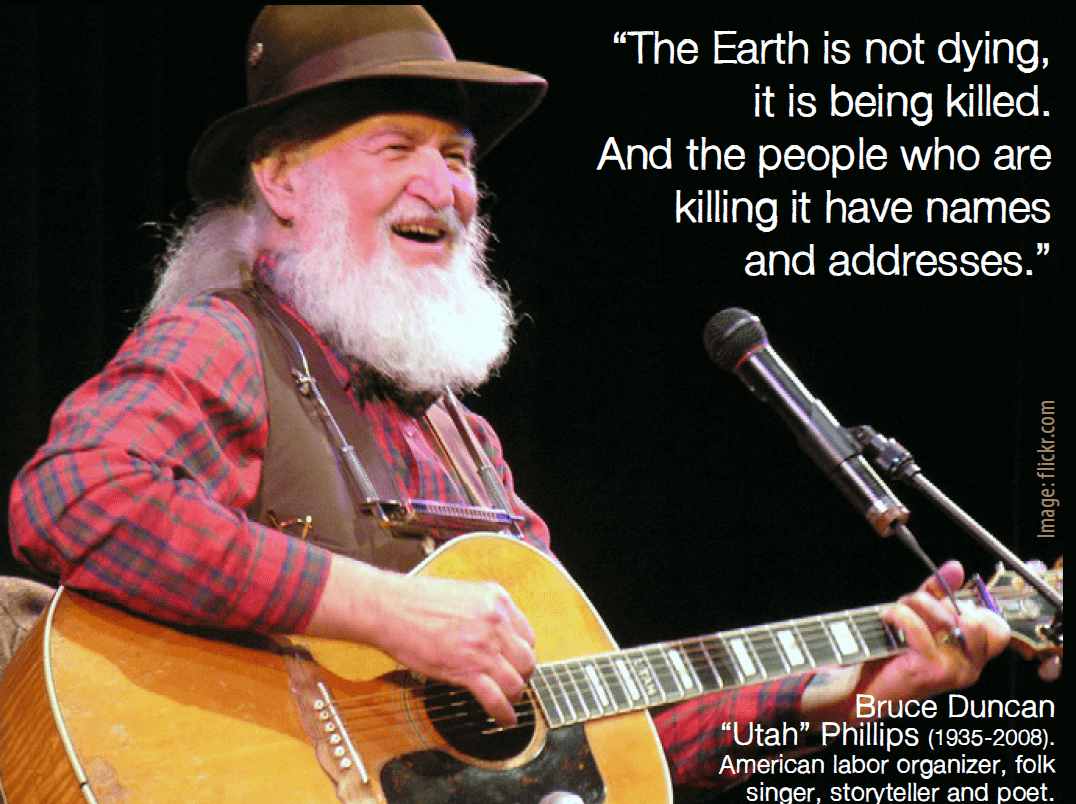
Dr Alexandra Carthey at Macquarie University in Sydney, Australia, might have just invented a tool to help small critters displaced by wildfires have a fighting chance at survival. The habitat pods, which are made of biodegradable cardboard, act as safe houses for animals such as possums, bandicoots, bush rats, and even reptiles during dangerous situations. Carthey was inspired to create a solution when she saw exposed wildlife being hunted by predators following the Black Summer bushfires in 2019. According to Macquarie University’s The Lighthouse publication, she found that while flying creatures, including bats, bees, and birds, have many innovative “nest boxes” catered to them, grounddwellers didn’t have the same means of protection. Hence, she created the mini shelters, which are pyramids … Read full text: Read full text:
Good Advice
19. DREAMS REMAIN DREAMS UNTIL YOU TAKE ACTION.
Without action, an idea is just a dream. Source: www.inc.com
Bachelor's of Corporate Governance
The Bachelor’s Degree in Corporate Governance goal is to provide students with a strong foundation and professional skills necessary to conduct groundbreaking research. The program helps students initiate, contribute to, and pursue a program of research in their chosen areas of inquiry. The Corporate Governance program is designed to advance the professional development of experienced graduates and professionals in that arena by extending their knowledge and equipping them with broad research and process Corporate Governance skills, enabling them to make a key leadership contribution to their chosen fields. AIU’s bachelor’s degree in Corporate Governance offers analytically challenging and problem-oriented programs on governance, policy analysis, management and leadership. We help students grow intellectually in a professional, research-intensive environment, characterized by public debate and stewardship for the public good. Your AIU Distance Learning Bachelor program in Corporate Governance will be a custom-made program, designed just for you by you and your advisor. This flexibility to meet your needs is seldom found in other distance learning programs. Our program does not require every student to study the same subjects and use the same books and other learning materials as every other student. Instead, our online Bachelor programs are designed just for you. They are individually designed to meet your needs and help you to reach your professional and personal goals.
Important:
Below is an example of the topics or areas you may develop and work on during your studies. By no means is it a complete or required list as AIU programs do not follow a standardized curriculum. It is meant solely as a reference point and example. Want to learn more about the curriculum design at AIU? Go ahead and visit our website, especially the Course and Curriculum section: https://wp24.aiu.edu/CourseCurriculum.html
Communication & Investigation (Comprehensive Resume)
Organization Theory (Portfolio)
Experiential Learning (Autobiography)
Academic Evaluation (Questionnaire)
Fundament of Knowledge (Integration Chart)
Fundamental Principles I (Philosophy of Education)
Professional Evaluation (Self Evaluation Matrix)
Development of Graduate Study (Guarantee of an Academic Degree)
Concepts of global governance and human security
Committees and Management roles
Governance Committees
Evaluate board structure and analyze the influence of the organization and board culture
Risk Management
Assess organizational acquisitions
Financing methods, and valuations
Governance, banks, and restructuring
Corporate Voting
Shareholder activism
The Internationalization of legal frameworks
Social Justice and Governance
Regulation and governance of privacy
Leadership and integrity
Political and management interactions
Bachelor Thesis Project
Bachelor Thesis Project
MBM300 Thesis Proposal
MBM302 Bachelor Thesis (5,000 words)
aiu.edu/apply-online.html
Pioneer Plaza/900 Fort Street Mall 410
Honolulu, HI 96813
800-993-0066 (Toll Free in US)
808-924-9567 (Internationally)
Each Bachelor graduate is encouraged to publish their research papers either online in the public domain or through professional journals and periodicals worldwide
About Us

Accreditation
Atlantic International University offers distance learning degree programs for adult learners at bachelors, masters, and doctoral level. With self paced program taken online, AIU lifts the obstacles that keep professional adults from completing their educational goals. Programs are available throughout a wide range of majors and areas of study. All of this with a philosophically holistic approach towards education fitting within the balance of your life and acknowledging the key role each individual can play in their community, country, and the world.
Atlantic International University is accredited by the Accreditation Service for International Schools, Colleges and Universities (ASIC). ASIC Accreditation is an internationally renowned quality standard for colleges and universities. Visit ASIC’s Directory of Accredited Colleges and Universities. ASIC is a member of CHEA International Quality Group (CIQG) in the USA, an approved accreditation body by the Ministerial Department of the Home Office in the UK, and is listed in the International Directory of the Council for Higher Education Accreditation (CHEA). The University is based in the United States and was established by corporate charter in 1998.
Our founding principles are based on the United Nations Universal Declaration of Human Rights; per article 26, AIU believes that Higher Education is a Human Right. The University has implemented a paradigm shifting educational model for its academic programs that have allowed it to move closer to this goal through the self-empowerment of its students, decentralization of the learning process, personalized open curriculum design, a sustainable learning model, developing 11 core elements of the Human Condition within MYAIU, and utilizing the quasi-infinite knowledge through the use of information technology combined with our own capacity to find solutions to all types of global issues, dynamic problems, and those of individuals and multidisciplinary teams. Due to these differentiations and the university’s mission, only a reputable accrediting agency with the vision and plasticity to integrate and adapt its processes around AIU’s proven and successful innovative programs could be selected. Unfortunately, the vast majority of accrediting agencies adhere to and follow obsolete processes and requirements that have outlived their usefulness and are in direct conflict with the university’s mission of offering a unique, dynamic, affordable, quality higher education to the nontraditional student (one who must work, study what he really needs for professional advancement, attend family issues, etc.). We believe that adopting outdated requirements and processes would impose increased financial burdens on students while severely limiting their opportunities to earn their degree and advance in all aspects. Thus, in selecting the ASIC as its accrediting agency, AIU ensured that its unique programs would not be transformed into a copy or clone of those offered by the 10,000+ colleges and universities around the world. Since ASIC is an international accrediting agency based outside the United States, we are required by statute HRS446E to place the following disclaimer: ATLANTIC INTERNATIONAL UNIVERSITY IS NOT ACCREDITED BY AN ACCREDITING AGENCY RECOGNIZED BY THE UNITED STATES SECRETARY OF EDUCATION. Note: In the United States and abroad, many licensing authorities require accredited degrees as the basis for eligibility for licensing.

In some cases, accredited colleges may not accept for transfer courses and degrees completed at unaccredited colleges, and some employers may require an accredited degree as a basis for eligibility for employment. Potential students should consider how the above may affect their interests, AIU respects the unique rules and regulations of each country and does not seek to influence the respective authorities. In the event that a prospective student wishes to carry out any government review or process in regards to his university degree, we recommend that the requirements of such are explored in detail with the relevant authorities by the prospective student as the university does not intervene in such processes. AIU students can be found in over 180 countries, they actively participate and volunteer in their communities as part of their academic program and have allocated thousands of service hours to diverse causes and initiatives. AIU programs follow the standards commonly used by colleges and universities in the United States with regards to the following: academic program structure, degree issued, transcript, and other graduation documents. AIU graduation documents can include an apostille and authentication from the US Department of State to facilitate their use internationally.
The AIU Difference
It is acknowledged that the act of learning is endogenous, (from within), rather than exogenous.
This fact is the underlying rationale for “Distance Learning”, in all of the programs offered by AIU. The combination of the underlying principles of student “self instruction”, (with guidance), collaborative development of curriculum unique to each student, and flexibility of time and place of study, provides the ideal learning environment to satisfy individual needs.
AIU is an institution of experiential learning and nontraditional education at a distance. There are no classrooms and attendance is not required.
The AIU Difference
MISSION:
To be a higher learning institution concerned about generating cultural development alternatives likely to be sustained in order to lead to a more efficient administration of the world village and its environment; exerting human and community rights through diversity with the ultimate goal of the satisfaction and evolution of the world.
VISION :
The empowerment of the individual towards the convergence of the world through a sustainable educational design based on andragogy and omniology.
Organizational Structure
Dr. Franklin Valcin
President/Academic Dean
Dr. Ricardo Gonzalez
Chief Operation Officer
and MKT Director
Dr. Miriam Garibaldi
Viceprovost for Research
Dr. Ofelia Miller
Director of AIU
Juan Pablo Moreno
Director of Operations
Paula Viera
Director of
Intelligence Systems
Felipe Gomez
Design Director / IT Supervisor
Daritza Ysla
IT Coordinator
Nadeem Awan
Chief Programming Officer
Dr. Jack Rosenzweig
Dean of Academic Affairs
Dr. Edward Lambert
Academic Director
Dr. Ariadna Romero
Advisor Coordinator
Nadia Gabaldon
Academic Coordinator
Jhanzaib Awan
Senior Programmer
Leonardo Salas
Human Resource Manager
Benjamin Joseph
IT and Technology Support
Rosie Perez
Finance Coordinator
Chris Soto
Admissions Counselor
Dr. José Mercado
Chief Executive Officer
Chairman of the Board of Trustees
Linda Collazo
Logistics Coordinator
Irina Ivashuk
Alumni Association
Coordinator
Clara Margalef
Director of Special Projects
of AIU
David Jung
Corporate/Legal Counsel
Bruce Kim
Advisor/Consultant
Thomas Kim
Corporate/
Accounting Counsel
Camila Correa
Quality Assurance Coordinator
Maricela Esparza
Administrative Coordinator
Chris Benjamin
IT and Hosting Support
Mayra Bolivar
Accounting Coordinator
Roberto Aldrett
Communications Coordinator
Giovanni Castillo
IT Support
Jaime Rotlewicz
Dean of Admissions
Dr. Mario Rios
Academic Advisor
Michael Phillips
Registrar’s Office
Rene Cordon
Admissions Support
Jenis Garcia
Admissions Counselor
Ricardo González, PhD
Provost
Dr. Silvia Restorff
Academic Advisor
Dr. Prakash Menon
Academic Advisor
Carlos Aponte
Telecommunications
Coordinator
Dr. Nilani Ljunggren De Silva
Academic Advisor
Dr. Scott Wilson
Academic Advisor
Dr. Mohammad Shaidul Islam
Academic Advisor
Dr. Edgar Colon
Academic Advisor
Deborah Rodriguez
Academic Tutor Coordinator
Cyndy Dominguez
Academic Tutor Coordinator
Kinmberly Diaz
Admissions Support Tutor
Amalia Aldrett
Admissions Coordinator
Sandra Garcia
Admissions Coordinator
Jose Neuhaus
Admissions Support
Junko Shimizu
Admissions Coordinator
Veronica Amuz
Admissions Coordinator
Alba Ochoa
Admissions Coordinator
Contact Us
Atlantic International University
900 Fort Street Mall 905 Honolulu, HI 96813
Quick Links
Home | Spanish | Online Courses | Available Courses | Vrtual Campus | Career Center | Available Positions | Ask Career Coach | The Job Interview | Resume Writing | Accreditation | Areas of Study | Bachelor Degree Programs | Masters Degree Programs | Doctoral Degree Programs | Course & Curriculum | Human Rights | Online Library | Representations | Student Publication | Sponsors | General Information | Mission & Vision | School of Business and Economics | School of Science and Engineering | School of Social an Human Studies | Media Center | Admission Requirements | Apply Online | Tuition | Faculty & Staff | Distance Learning Overview | Student Testimonials | Frequently Asked Questions | Register for Program | Privacy Policy | FAQ


